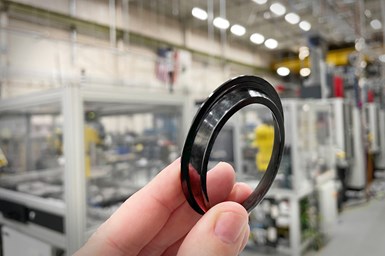Arris Composites announces Sustainable Consumer Products Program using Additive Molding technology
Oval bezel demonstrator for consumer electronics has sub-millimeter features, out-performs metal, is antenna transparent and more than 50% of the matrix comes from a renewable plant source.
On Jan. 6 Arris Composites (Berkeley, Calif., U.S.) revealed at the Consumer Electronics Show (CES) its Sustainable Products Program dedicated to helping consumer product design teams improve sustainability without compromising product performance.
“The way consumer product teams can design, engineer and manufacture products has finally caught up with their corporate and personal values,” says Ethan Escowitz, CEO and founder at Arris. “As many forward-thinking product team members know, for too long, sustainable materials meant compromising product performance, which is inconsistent with any lasting brand.”
Arris says its Sustainable Consumer Products Program works with product design teams to break new ground in both product performance and corporate sustainability. Customers in the program have a two-fold engagement with the Arris technical team. First, they employ next-generation advanced materials and processes to create breakthrough products. Second, they select the materials and process characteristics that best suit their corporate sustainability objectives. Arris reports that its demonstration part, an oval bezel with a glossy surface finish for consumer electronics, has sub-millimeter features, out-performs metal, is antenna transparent and more than 50% of the matrix comes from a renewable plant source.
“Our team has been working hard on consumer product solutions, and we’re all really proud to share these tools to enable sustainability without compromise,” says Escowitz. “We’re excited to see what forward-thinking product design teams will make and the impact they will have.”
Founded in 2017, Arris says it pioneered the development of a patented end-to-end automated manufacturing technology, Additive Molding, that leverages advanced composites, additive technologies and high-volume production methods to unlock new product design possibilities for mass-market products. This is further emphasized via an announced collaboration with Airbus (Toulouse, France) demonstrating a reduction in commercial aviation emissions using Additive Molding. By replacing metal brackets with Arris’ aerospace-grade continuous carbon fiber composite parts, more than 75% weight savings was achieved, resulting in lifetime fuel savings potential for commercial aircraft.
Related Content
-
Hexagon Purus Westminster: Experience, growth, new developments in hydrogen storage
Hexagon Purus scales production of Type 4 composite tanks, discusses growth, recyclability, sensors and carbon fiber supply and sustainability.
-
Watch: A practical view of sustainability in composites product development
Markus Beer of Forward Engineering addresses definitions of sustainability, how to approach sustainability goals, the role of life cycle analysis (LCA) and social, environmental and governmental driving forces. Watch his “CW Tech Days: Sustainability” presentation.
-
Plant tour: Arris Composites, Berkeley, Calif., U.S.
The creator of Additive Molding is leveraging automation and thermoplastics to provide high-volume, high-quality, sustainable composites manufacturing services.















.jpg;maxWidth=300;quality=90)

